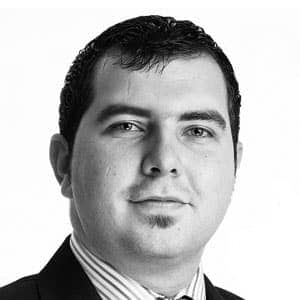
- Alex Mareniuc
- April 15, 2022
Facebook
Twitter
WhatsApp
Telegram
Email
The Next Level of Discipleship
A third invitation was to cross over from a comfortable discipleship within controllable parameters to the unknown where people and situations are unpredictable and alternative methods are required.

Simon was just a regular guy living a perfectly normal life. After spending his early years in the town of Bethsaida, he moved to Capernaum by the Sea of Galilee where he met his wife and started a small fishing business. His daily routine included waking up early in the morning to be among the first ones to cast their nets in the water, bringing the fish back to shore, selling the fish to distributors, mending the nets to prepare them for the next day, and finally going home to spend some time with the family before calling it a day. This happened every day except Saturdays because Simon practised his faith by disrupting his work routine with a Sabbath rest. On that day, he went to church – called ‘synagogue’, worshipped God, and spent time with family and friends. Week after week, Simon followed the same pattern – sleep, eat, work, spend time with family and friends, go to church, repeat.
His brother Andrew felt that there was more to his relationship with God than simply going to church one day a week and on special religious holidays. He understood his relationship with God to be a process that required one to be proactive, something that is constantly growing and evolving. Therefore, when news reached him about John ‘the Baptist’ preaching in the wilderness and baptising people, he went and joined as a disciple thinking that he had finally found the spiritual fulfilment he was after. But one day, a man called Jesus turned up whom John called the ‘Son of God’ and the ‘Lamb of God’. Without delay, Andrew decided that he had to follow this Jesus and experience a new type of discipleship.
And he didn’t stop there because he didn’t want to keep to himself something that could potentially change one’s life forever. He went to find his brother Simon to bring him to Jesus as well. This did change Simon’s life forever. Jesus challenged him to cross over from his old lifestyle where everything happened in a pattern into a new life where he was actually part of a movement. He invited Simon not to be content with simply living a normal life but to experience a new, dynamic reality. And to mark Simon’s new reality, Jesus also changed his name to ‘Peter’ to describe his future role as a rock in the movement that Jesus was about to establish.
A second invitation to cross over to the next level of his discipleship followed a while later, confirming that faith is not static and that being content with one transformational spiritual experience – no matter how supernatural it might have been – is not what God intended. After their first encounter, Peter returned home. That was until one day when Jesus turned up to say ‘It’s time. Follow Me.’ and Peter left everything to follow Jesus. They went on to preach, teach and heal people in Israel and spent a lot of time in Galilee, a place that Peter was familiar with. The experience proved to be a pleasant one. He felt comfortable being around people who were like him. He understood their lifestyle. He knew their religious experience. He was able to build a rapport with them which helped tremendously the growth of Jesus’ movement.
Peter was happy with that kind of discipleship. Yes, his old routine was disrupted and going to church once a week was history because now he was ‘doing church’ every day wherever he was. Yes, he had to accept that even people he used to dislike, like Levi the tax collector, were called by Jesus and they were walking together. Yes, he was paying more attention to those deemed as social pariahs. But at least he was working with people who already had a similar foundation to him and simply needed an update to their antiquated understanding of God’s character and God’s plan for them. He felt he was aiding Jesus repair the broken society in Israel in preparation for taking up the role of Messiah and making Israel a great nation once again.
But Peter’s discipleship was not complete. A third invitation was to cross over from a comfortable discipleship within controllable parameters to the unknown where people and situations are unpredictable and alternative methods are required. One day, after teaching the crowds by the sea, Jesus instructed His disciples to prepare to cross to the other side where non-Jewish people lived. There, Jesus cast out demons from a foreign man who subsequently preached about Jesus in the Decapolis to other non-Jewish people. Jesus stated that a Roman centurion had more faith than the people He met in Israel, and that some of those who thought they had a straight passage into heaven because of their knowledge of God would be bitterly disappointed. Jesus healed foreigners in the same way that he healed the people of Israel. From this, Peter was meant to understand that real discipleship was not only about Jesus’ challenges to him, but also how he needed to challenge himself to complete the transformation.
Simon was invited to break away from his routine and re-evaluate his relationship with God. Upon becoming Peter, the idea that church once a week and simply knowing about God being enough to make one feel spiritually fulfilled was replaced by the reality that faith is a continuous process. He learned about being uncomfortable and loving people regardless of who they were. He learned about not only thinking outside the box, but about collapsing the box and putting it in the bin forever. He learned about the real discipleship that actively involved the follower. He had to process the paradigm shift proposed by Jesus and incorporate it in his lifestyle. But because Simon Peter accepted Jesus’ invitations to cross over from one stage of discipleship to another, he was ultimately ready to lead the church in Jerusalem once Jesus’ ministry on Earth was completed.
Alex Mareniuc is an ordained minister currently serving Chatham, Riverway and Maidstone in South England Conference.

How Should Christians be Different?
September 6, 2023

The Pastoral Caregiver – Bearer of Stories
September 6, 2023

What Takes to be Different?
September 6, 2023

The Beauty of Diversity Within the Body of Christ
September 6, 2023

The Butterfly, an Object Lesson of Transformation
September 6, 2023

Mitigating the Risks of Cultural Compromises
September 6, 2023

Embracing Christ-Centered Counterculture
September 6, 2023








